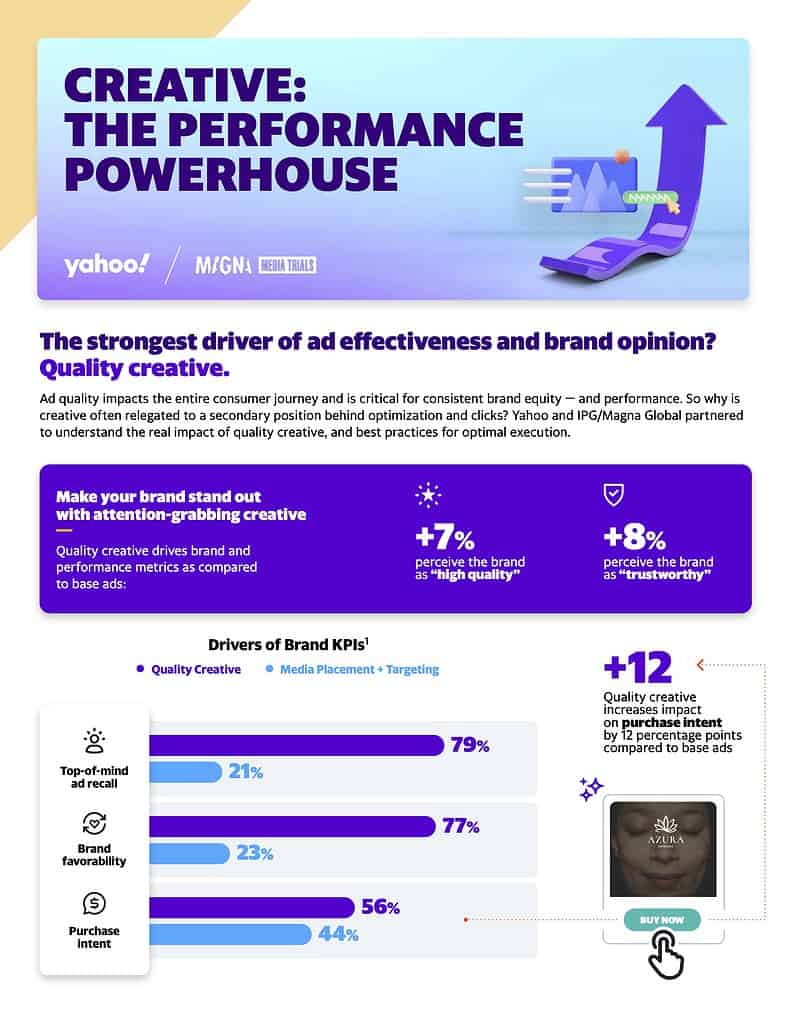MAGNA and Yahoo have released findings from their research into understanding the role that creative quality plays in ad effectiveness and the elements that contribute to quality creative.
The study – titled Creative, the Performance Powerhouse Media – found that placement and creative work hand in hand when it comes to effective advertising strategies.
It found that while media placement helps marketers find consumers where they are, creative quality was responsible for 56% of purchase intent, illustrating the strong performance of both tactics as they work together.
The study suggests that marketers can greatly benefit from making small improvements to their creative in order to optimise ad performance while also driving brand quality and trust.
The MAGNA and Yahoo study findings also suggest that marketers should be optimising their media across devices, such as taking advantage of the mobile mindset by ensuring compelling brand propositions and calls-to-action (CTAs).
On desktop/laptop, brands should consider prioritising imagery to attract attention on the larger screen size and consider including people in ads to more effectively connect with consumers.

Additional key findings of Creative, the Performance Powerhouse include:
• Poor creative can make or break ad memorability: Creative quality leads to +23% aided ad-recall, which drops to +2% for ads with poor creative quality.
• Strong visuals draw in consumers with the propensity to buy: Those in-market for the product are much more likely to notice (+20% lift) and enjoy (+13% lift) ads with improved visuals, such as a human presence, product images, or prominent logo placement.
• The larger canvas of desktop benefits from optimised imagery: Improved imagery on desktop leads to high search intent (+23% lift), as well as improved message association (+50% lift).
• Ads with more informative messaging are seen for a longer timeframe and prompt next steps on mobile: Ads with explicit brand propositions stay on screen +8 seconds longer and prompt consumers to look for deals (+32% lift) and consider the brand (+27% lift).
• Improving the call-to-action drives interest and action: Improving the call-to-action with direct messaging and strong design can result in many positive outcomes, including piquing consumer interest in the product (+11% lift); likelihood to visit the brand’s website (+41% lift), and likelihood to look for offers/deals (+77% lift).
Kara Manatt, EVP, managing director, intelligence solutions at MAGNA, the intelligence and investment arm of IPG Mediabrands, said: “When we began this study, we really wanted to emphasise that marketers shouldn’t let creative fall to the wayside in their marketing strategies because it plays an integral role in helping brands stand out and shaping opinions.”
“Media placement and utilising creative to reach the right audiences are equally important in successful advertising campaigns, but no amount of great media can perform well if creative is mediocre,” she added.
Elizabeth Herbst-Brady, chief revenue officer of Yahoo, said: “Creative is a fundamental element for the success of any marketing campaign. When paired with premium placement, optimised targeting, and strategic timing, the message is amplified and consumers are more compelled to not only recall the ad, but also to take action.”
The study surveyed 4,100 respondents across 61 metrics, and tested brands spanning three industry verticals including auto, food delivery service and CPG.
The study tested display ads with a variety of attributes across desktop/laptop and mobile devices. The types of ads tested per brand were control ads, base ads, and ads with optimised creative.
Variables used in the optimised ad types were improved imagery, enhanced call-to-action, more informative messaging, and all creative enhancements.
